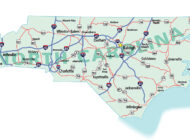What’s the least unionized state in the country?
According to the Bureau of Labor Statistics (BLS), the top spot goes to North Carolina, with less than one in 50 employees holding union memberships.
 This same BLS analysis, summarized by a 2015 Washington Examiner article, showed that the fastest growing states in the U.S. also tend to be states with lower-than-average rates of union membership.
This same BLS analysis, summarized by a 2015 Washington Examiner article, showed that the fastest growing states in the U.S. also tend to be states with lower-than-average rates of union membership.
Reasons to consider right to work states for your logistics location
More and more companies are looking at right to work states, and specifically North Carolina, when considering where to locate a plant or a distribution center. Here’s why:
- The entire NC-based supply chain has very limited exposure to union strikes or “slowdowns”
- The traditional cost of labor in a non-unionized company is less than in a highly unionized company
- Work stoppages among different but related unions is removed as a supply chain risk
- The thorny issue of dealing with labor unions and strikes is a “non-issue” in NC logistics legal contracts.
- The outsourcing of supply chain tasks, such as handling, kitting and transporting, are systematically smoother because the unions do not have the leverage to threaten action within the outsourcing company’s workforce that they may have if the logistics company’s workforce were part of the same union
- Non-union 3PLs are more flexible because they are able to manage the workforce directly and not have to “pigeon hole” employees into particular jobs
Logistics site selection
The recent turmoil at the docks in Southern California make it painfully clear that the issue of unionization is very relevant to supply chain strategy. Many companies have consciously shifted a portion of their imports to Gulf and East Coast ports as a hedge against future work slowdowns.
When selecting a location for a distribution center, many factors are at play, including freight transportation efficiency, labor availability and financial incentives. Right to work states like North Carolina, that can offer these advantages, plus a cost-effective, non-union workforce, have a decided advantage.



